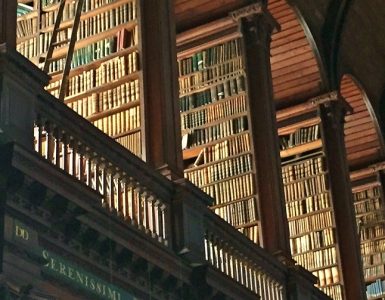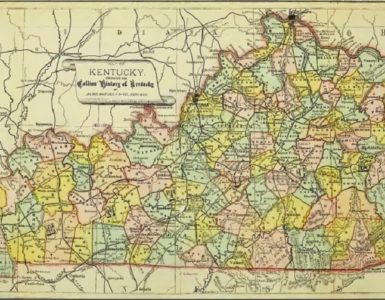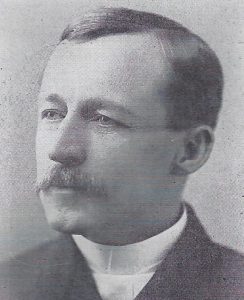 Edward Payson Davis was born in Rutherfordton, North Carolina, July 12, 1851. His father, Thomas, was from South Carolina but had moved across the state line to complete his college program in Davidson, he then travelled further north into Virginia to study for the ministry in Union Theological Seminary near Richmond. Thomas was ordained in 1845 and the following year he married Harriet Lee Dobson of Greenville, Tennessee. At the time of Edward’s birth, Thomas was the pastor of the Little Britain and Rutherfordton Presbyterian Churches. Like his father, Edward graduated from Davidson College, but unlike dear old dad he prepared for the ministry in Columbia Theological Seminary.
Edward Payson Davis was born in Rutherfordton, North Carolina, July 12, 1851. His father, Thomas, was from South Carolina but had moved across the state line to complete his college program in Davidson, he then travelled further north into Virginia to study for the ministry in Union Theological Seminary near Richmond. Thomas was ordained in 1845 and the following year he married Harriet Lee Dobson of Greenville, Tennessee. At the time of Edward’s birth, Thomas was the pastor of the Little Britain and Rutherfordton Presbyterian Churches. Like his father, Edward graduated from Davidson College, but unlike dear old dad he prepared for the ministry in Columbia Theological Seminary.
Candidate Davis was licensed in 1877 by Mecklenburg Presbytery and later the same year ordained by South Carolina Presbytery to serve the Hopewell and Willington congregations in Abbeville County, South Carolina. For many years the Willington Church had been shepherded by Moses Waddel, who was also the founder of both Willington Academy and what is currently the University of Georgia. It was not too long before Pastor Davis married Mary Agnes Lowry of Calhoun Falls, December 29, 1880. For the years 1883-1892, he ministered briefly in churches in North Carolina at Shelby, Kings Mountain, Shiloh, and First Church in Winston-Salem. During the Winston-Salem call the church completed a new building and Davis’s professor from Columbia Seminary, John L. Girardeau, participated in the dedication ceremonies. The household then moved to Alabama where E. P. Davis ministered the Word in First Church, Montgomery, and then in 1900 the household moved east to the Presbyterian Church in Opelika on the Chattahoochee River. In 1905, the year President Theodore Roosevelt was inaugurated for his second term, Rev. Davis returned to South Carolina to accept a call to Second Presbyterian Church in Greenville which would be his last and longest tenured ministry.
Dr. and Mrs. Davis had six children, four girls and two boys. The girls were named Fannie, Mary, Roberta, and Mattie, and the boys were E. P. Davis, Jr. and Lowry. Lowry was born in 1881 during his father’s pastorate in Abbeville County, and he grew up to follow in his father and grandfathers’ footsteps by stepping into the pastoral ministry. The blessings of the Covenant of Grace had come forth in three generations of Davis ministers. Lowry completed his studies in South Western Presbyterian University in Tennessee, then he studied theology in Union Seminary in Virginia. In 1909, he married Mary Elizabeth Barnett and they moved to Kashing, China, where he served in a boys’ school until he retired. E. P. Davis must have been proud of his son’s service given his own comments on missions in the article “The Regal Character of Christ: An Argument for Foreign Missions.”
During Dr. Davis’ many years of ministry he practiced his commitment to Presbyterian polity, theology, and connectional presbyterianism. He was the moderator of the Synod of Alabama, the Synod of South Carolina, and Enoree Presbytery where he also served as the stated clerk following his retirement from pastoral ministry. The Great War had just ended on Nov. 11, 1918 when Dr. Davis was elected moderator of the Synod of South Carolina during its meeting in Central Church, Anderson—the meeting had been postponed from its regularly scheduled date because of a quarantine to stop the spread of the influenza epidemic. One moderator’s sermon by Dr. Davis before Enoree Presbytery was published in a pamphlet titled, “Why Our Church Believes in and Practices Sprinkling as the Mode of Baptism for Child and Adult.”
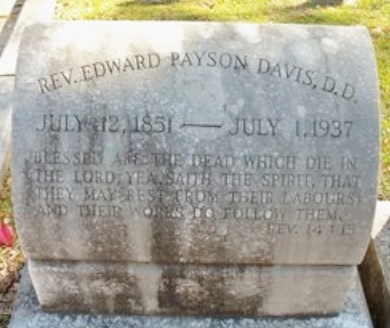 During his decades of ministry, E. P. Davis was honored with the Doctor of Divinity by both Southwestern Presbyterian University in Tennessee and his beloved Davidson College. He was president of the Alabama State Sabbath Association, a trustee of Davidson College, a trustee of Columbia Theological Seminary, and a trustee of the institution from which all four of his daughters graduated, Chicora College. However, possibly his greatest honor was the appreciation and love shown by the citizens of Greenville after he died just short of his eighty-sixth birthday on July 1, 1837. Due to the projected large crowd of mourners the service was held in First Presbyterian Church under the direction of its retired pastor, T. W. Sloan, who was assisted by both First Church’s Charles Haddon Nabers and retired Pendleton Baptist Church minister, B. D. Hahn. Pallbearers included Charles M. Riser, B. B. Smith, Talmadge Garrett, Ed Woodside, E. O. Todd, Henry T. Mills, Trenholm Mallard, and W. G. Gresham, which constituted a mix of both Second Church members and appreciative citizens. The members of the Greenville Ministerial Association were asked to attend the service as honorary escorts.
During his decades of ministry, E. P. Davis was honored with the Doctor of Divinity by both Southwestern Presbyterian University in Tennessee and his beloved Davidson College. He was president of the Alabama State Sabbath Association, a trustee of Davidson College, a trustee of Columbia Theological Seminary, and a trustee of the institution from which all four of his daughters graduated, Chicora College. However, possibly his greatest honor was the appreciation and love shown by the citizens of Greenville after he died just short of his eighty-sixth birthday on July 1, 1837. Due to the projected large crowd of mourners the service was held in First Presbyterian Church under the direction of its retired pastor, T. W. Sloan, who was assisted by both First Church’s Charles Haddon Nabers and retired Pendleton Baptist Church minister, B. D. Hahn. Pallbearers included Charles M. Riser, B. B. Smith, Talmadge Garrett, Ed Woodside, E. O. Todd, Henry T. Mills, Trenholm Mallard, and W. G. Gresham, which constituted a mix of both Second Church members and appreciative citizens. The members of the Greenville Ministerial Association were asked to attend the service as honorary escorts.
The following quote is from Dr. Davis’s previously mentioned article that was published in the Southern Presbyterian Review, July 1883, under the title, “The Regal Character of Christ, An Argument for Foreign Missions.” The article alludes to the parables of Matthew 13 from a possibly postmillennial perspective.
Christ’s is a progressive kingdom. It gradually takes possession of the individual soul, illumines the darkened intellect, subdues the stubborn will, and destroys carnality in the affections. The streams of thought, word, and act that flow from the regenerated soul are more colored with holiness. The leaven of Christian truth by degrees diffuses itself through the corrupt mass of the natural heart. The old man is in a dying state, and the new man is more and more actuated by spiritual motives, governed by spiritual laws, and his mind and heart furnished with spiritual ideas, principles, and dispositions, which manifest themselves in a spiritual life. As it is in the individual, so it is in the world: the law of development obtains. The land of Canaan was not at once conquered by the Israelites. The kingdom of heaven in the world is like a grain of mustard seed sowed in a field. When sowed, it is the least of seeds, but when it germinates, grows, and matures, it is the greatest among herbs.
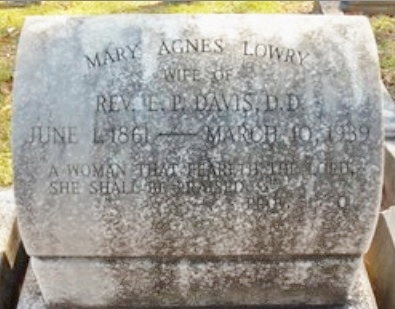 The verses on the grave markers for Edward and Mary Davis express well the emphases of their lives. On the marker for Dr. Davis the New Testament verse reads, “Blessed are the dead which die in the Lord, yea, saith the Spirit, that they may rest from their labors and their works do follow them” (Revelation 14:13). Mary passed away March 10, 1939 and her life as a Christian wife and mother was remembered with the wisdom of the Proverb praising a virtuous woman, “A woman that feareth the Lord, she shall be praised” (31:30).
The verses on the grave markers for Edward and Mary Davis express well the emphases of their lives. On the marker for Dr. Davis the New Testament verse reads, “Blessed are the dead which die in the Lord, yea, saith the Spirit, that they may rest from their labors and their works do follow them” (Revelation 14:13). Mary passed away March 10, 1939 and her life as a Christian wife and mother was remembered with the wisdom of the Proverb praising a virtuous woman, “A woman that feareth the Lord, she shall be praised” (31:30).
Barry Waugh
Notes–The header image showing Chicora College is from the digital collection of the Greenville County Library System. Chicora’s property was north of South Main and west of the Reedy River. Details regarding Dr. Davis’ funeral were taken from his obituary in The Greenville News, Friday, July 2, 1937. The facts concerning the participation of J. L. Girardeau in the building dedication services of First Church, Winston-Salem, are found on pages 43-44 of Wiley and East, The Book of Remembrance 1862-1962: First Presbyterian Church of Winston-Salem, North Carolina. Dr. Davis’ Southern Presbyterian Review article is available on Hathi Trust for viewing.



